I'm doing a mobile application, all is almost as WindowsForms but when I close a MessageBox that provoque the multiple dialogs close with DialogResult in DialogResult.OK I find a problem, the main form it hides.
The structure is as follows:
program.cs
Application.Run(new From1());
Form1
Dialog1 frmDialog1 = new Dialog1());
frmDialog1.ShowDialog(this);
Dialog1(Windows Parent)
Dialog2 frmDialog2 = new Dialog2());
frmDialog2.ShowDialog(this);
if(frmDialog2.DialogResult == DialogResult.OK)
{
this.DialogResult = DialogResult.OK;
this.Close();
}
Dialog2(Windows Parent)
Dialog3 frmDialog3 = new Dialog3());
frmDialog3.ShowDialog(this);
if(frmDialog3.DialogResult == DialogResult.OK)
{
this.DialogResult = DialogResult.OK;
this.ParentForm.Hide();
this.Close();
}
Dialog3(Windows Parent)
if (MessageBox.Show("Do you want to save?", "Save?",
MessageBoxButtons.YesNo,
MessageBoxIcon.Question,
MessageBoxDefaultButton.Button1) == DialogResult.Yes)
{
this.DialogResult = DialogResult.OK;
this.ParentForm.Hide();
this.Close();
}
**Note: I'm using [DllImport("coredll.dll")] to show full screen
using System;
using System.Runtime.InteropServices;
using System.Windows.Forms;
[Flags()]
public enum FullScreenFlags : int
{
SwHide = 0,
ShowTaskbar = 0x1,
HideTaskbar = 0x2,
ShowSipButton = 0x4,
HideSipButton = 0x8,
SwRestore = 9,
ShowStartIcon = 0x10,
HideStartIcon = 0x20
}
static class FullScreen
{
#region Win32 API Calls
/// <summary>
/// The GetCapture function retrieves a handle to the window
/// </summary>
/// <returns></returns>
[DllImport("coredll.dll")]
private static extern IntPtr GetCapture();
/// <summary>
/// The SetCapture function sets the mouse capture to
/// the specified window belonging to the current thread
/// </summary>
/// <param name="hWnd"></param>
/// <returns></returns>
[DllImport("coredll.dll")]
private static extern IntPtr SetCapture(IntPtr hWnd);
/// <summary>
/// This function can be used to take over certain areas of the screen
/// It is used to modify the taskbar, Input Panel button,
/// or Start menu icon.
/// </summary>
/// <param name="hwnd"></param>
/// <param name="state"></param>
/// <returns></returns>
[DllImport("aygshell.dll", SetLastError = true)]
private static extern bool SHFullScreen(IntPtr hwnd, int state);
/// <summary>
/// The function retrieves the handle to the top-level
/// window whose class name and window name match
/// the specified strings. This function does not search child windows.
/// </summary>
/// <param name="lpClass"></param>
/// <param name="lpWindow"></param>
/// <returns></returns>
[DllImport("coredll.dll", SetLastError = true)]
private static extern IntPtr FindWindowW(string lpClass, string
lpWindow);
/// <summary>
/// changes the position and dimensions of the specified window
/// </summary>
/// <param name="hwnd"></param>
/// <param name="x"></param>
/// <param name="y"></param>
/// <param name="w"></param>
/// <param name="l"></param>
/// <param name="repaint"></param>
/// <returns></returns>
[DllImport("coredll.dll", SetLastError = true)]
private static extern IntPtr MoveWindow(IntPtr hwnd, int x, int y, int
w, int l, int repaint);
#endregion
#region General Methods
/// <summary>
/// obtain the window handle of a .Net window or control
/// </summary>
/// <param name="c"></param>
/// <returns></returns>
public static IntPtr GetHWnd(Control c)
{
IntPtr hOldWnd = GetCapture();
c.Capture = true;
IntPtr hWnd = GetCapture();
c.Capture = false;
SetCapture(hOldWnd);
return hWnd;
}
/// <summary>
/// Set Full Screen Mode
/// </summary>
/// <param name="form"></param>
public static void StartFullScreen(Form form)
{
//if not Pocket Pc platform
if (!Platform.PlatformDetection.IsPocketPC())
{
//Set Full Screen For Windows CE Device
//Normalize windows state
form.WindowState = FormWindowState.Normal;
IntPtr iptr = form.Handle;
SHFullScreen(iptr, (int)FullScreenFlags.HideStartIcon);
//detect taskbar height
int taskbarHeight = Screen.PrimaryScreen.Bounds.Height - Screen.PrimaryScreen.WorkingArea.Height;
// move the viewing window north taskbar height to get rid of the command
//bar
MoveWindow(iptr, 0, -taskbarHeight, Screen.PrimaryScreen.Bounds.Width, Screen.PrimaryScreen.Bounds.Height + taskbarHeight, 1);
// move the task bar south taskbar height so that its not visible anylonger
IntPtr iptrTB = FindWindowW("HHTaskBar", null);
MoveWindow(iptrTB, 0, Screen.PrimaryScreen.Bounds.Height, Screen.PrimaryScreen.Bounds.Width, taskbarHeight, 1);
}
else //pocket pc platform
{
//Set Full Screen For Pocket Pc Device
form.Menu = null;
form.ControlBox = false;
form.FormBorderStyle = FormBorderStyle.None;
form.WindowState = FormWindowState.Maximized;
form.Text = string.Empty;
}
}
/// <summary>
/// Stop Full Screen Mode
/// </summary>
/// <param name="form"></param>
public static void StopFullScreen(Form form)
{
//if windows ce return window and taskbar to his original place
if (!Platform.PlatformDetection.IsPocketPC())
{
IntPtr iptr = form.Handle;
SHFullScreen(iptr, (int)FullScreenFlags.ShowStartIcon);
//detect taskbar height
int taskbarHeight = Screen.PrimaryScreen.Bounds.Height - Screen.PrimaryScreen.WorkingArea.Height;
MoveWindow(iptr, 0, 0, Screen.PrimaryScreen.Bounds.Width, Screen.PrimaryScreen.Bounds.Height - taskbarHeight, 1);
IntPtr iptrTB = FindWindowW("HHTaskBar", null);
MoveWindow(iptrTB, 0, Screen.PrimaryScreen.Bounds.Height - taskbarHeight, Screen.PrimaryScreen.Bounds.Width, taskbarHeight, 1);
}
}
#endregion
}
**Other comment:
I´m calling this.ParentFormHide(); because I desire that the parent it is hide before then close it. This for prevent then it show wrong, as like the follows:
This is shown when is closing multiple dialogs in cascade
If you know a way to prevent this animation on closing multiple dialogs, please share to me. At present to prevent this, I'm hiding the previous dialog before to close it.
Thanks in advance

